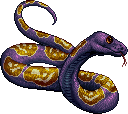Viewing ID 2-2-3 G1 'Tonne'

Breed: Songa Kreinto ❄ This is a seasonal species.
View checklist
Gender: Female
Father: Unknown
Unknown Pedigree
Hardiness: 57
Appearance: 5
Emerged: 23:42 06.10.2022
Matured: 13:42 08.10.2022
Songa Kreintos spend much of the year in hibernation, emerging from their underground dens in early autumn when their favorite prey—small mammals and birds—are fattening up for winter. They are ambush predators, preferring to lurk near ripe berry bushes or in fruit-laden trees until a suitable quarry approaches. With a swift lunge, a Songa Kreinto sinks its fangs into its target and injects its venom. This potent venom is a brilliant violet color and can cause hallucinatory effects in small doses. A larger dose can paralyze even humans. Extreme caution should be exercised when handling these reptiles in a laboratory environment; a proper antivenom is still under development. During their brief breeding season, female Songa Kreintos lay their eggs in tree holes or nesting dens near suitable hunting grounds. Juveniles are able to hunt soon after they emerge and will linger near their birthplace for a few days before dispersing.
The creatures that dwell in this rather desolate world still display some diversity in appearance, eating habits, and social behavior. Whether they have fur or feathers, skin or scales, their unique genetic makeup allows for a variety of colors and markings within each species. Despite limitations in food sources, herbivores, omnivores, and carnivores are all present in the food chain, and each species requires specialized care within a laboratory. Although the artificial setting of housing units and breeding pods precludes most opportunities to study true interspecific behavior, the interactions within and between species has been studied extensively in the wilderness by scientists daring enough to venture beyond the outpost’s walls.
